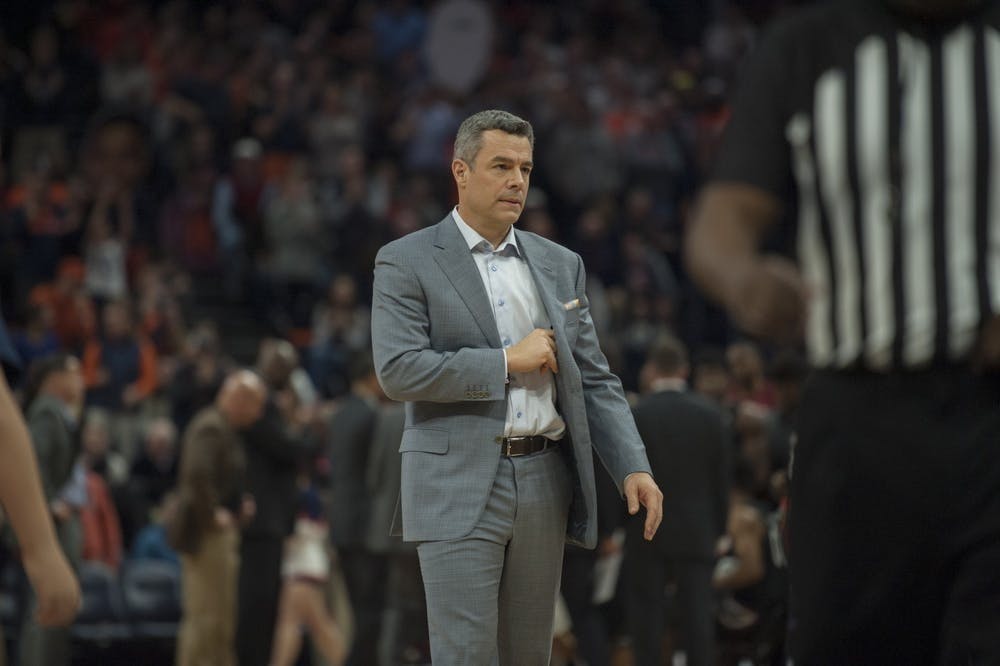The cancellation of all winter and spring NCAA championships presents a clear issue for Virginia sports fans — no March Madness. However, missing the tournament is just the start of problems for student-athletes — this will also mean a massive loss of revenue for both Virginia Athletics and the NCAA.
Marketing and television rights
In addition to championship ticket sales, the NCAA’s website lists Division I men’s basketball marketing and television rights as the biggest component of its total revenue — these provide over $850 million for the NCAA and by extension, all athletic programs. The extension of the NCAA’s multimedia rights contract in 2016 with CBS Sports and Turner provides that more than 90 percent of revenue generated will directly benefit student-athletes through programs, services and funding such as scholarships and educational programming for student-athletes.
“The agreement ensures student-athletes across all three NCAA divisions will continue to be supported through a broad range of championship opportunities, access to funds for personal and educational needs, and through scholarships in Divisions I and II,” reads the press release from when the contract was extended in 2016.
Without the funds generated from televising March Madness, it is unclear how the NCAA will be able to continue supporting not just basketball players, but all student-athletes at the same level. Furthermore, the extension of eligibility for spring athletes means that even more students will require financial aid, as the University has 11 spring sports teams alone.
The basketball fund
March Madness itself allows the NCAA to return almost 60 percent of overall revenue to Division I institutions through a “basketball fund.” In this system, monetary values are assigned to units, which represent fractions of total revenue. The farther teams advance during March Madness, the more units their conference earns and can thus distribute to individual schools how they see fit. Teams earn one unit for just making it to the tournament itself, and the championship is an exception to the rule.
Units in 2019 were worth $280,300 each — since Virginia played every round, the team earned 6 units, or over $1.6 million, for the ACC. Units increase in value every year, typically by around three percent, and the money is distributed to conferences over a period of six years.
However, because the ACC typically splits money equally among member schools, Virginia Athletics can also benefit from its competitors going far in the tournament.
“The ACC conference received $30.6 million from 18 total units in the 2017 tournament,” a 2018 Cavalier Daily article read. “The University gained two units [in 2017] equaling $3.4 million for the conference, but the way the distribution works, the $30.6 million was divided by the 14 schools to be split as $2.19 million per school.”
Not only will the ACC and individual athletic departments hurt without units earned by Virginia, they will also suffer the loss of units from other schools that routinely qualify for the tournament, such as Duke, Louisville and Florida State. Further, without March Madness itself, it remains unclear if and how the NCAA will allocate units and, additionally, how much money the organization has to distribute.
This revenue is used to improve facilities and programs, sell merchandise, pay salaries, increase exposure, support travel and outreach, finance operational costs and recruit new talent. However, the basketball fund is just one of the many ways the ACC — and Virginia Athletics by extension — generates revenue from March Madness.
Alumni donations and exposure
The increased exposure that schools receive from performing well in March Madness is unquantifiable. After men’s basketball won the tournament in 2019, the University overenrolled the class of 2023 and received its largest early action applicant pool in history for the class of 2024. Undoubtedly, there were many reasons for these events — however, it’s hard to deny that the University did receive plenty of free publicity to potential students from the tournament.
Additionally, tournaments like March Madness are a great way to remind alumni of fond memories and maximize school spirit, thus allowing universities to rake in donations — contributions made up $27 million, or 25.3 percent of Virginia Athletics’ total revenue in 2018.
“No financial value can be placed on the benefit of the [basketball] program,” former Director of Athletics Craig Littlepage said in an interview with The Cavalier Daily in 2018. “And there’s no way to market a university better than a few nights in March.”
Student fees
Virginia Athletics often spends more money than it makes. For example, in 2017 and 2018, the department outspent itself by $300,000 and $7 million, respectively. This fluctuation means that students often foot a portion of the cost of sports programs by paying mandatory athletics fees as a part of tuition. In 2018, student fees at the University were the third largest component of Virginia Athletics’ revenue, as they accounted for $14.2 million, or 13.4 percent, of total revenue. These mandatory fees aren’t just unique to Virginia, however. In 2014, the Power Five — the five wealthiest athletic conferences in college sports, including but not limited to the ACC, SEC and Big 10 — accrued a total of $125.5 million from mandatory fees.
During the 2019-2020 academic year, the University’s athletics fee was $657. It will increase by 3.2 percent for the 2020-2021 school year, making it $678. However, with the loss of revenue from March Madness, it is unclear if students will be expected to pay an even higher fee in future years to mitigate this financial loss. Virginia Athletics does not seem to have developed a plan to address the financial fallout of March Madness yet.
“There will be an impact, but it’s way too early to be able to determine what that will be,” Director of Athletics Carla Williams said. “You [have] people around the country who are losing revenue from different sources and different businesses. So we’ll see.”







